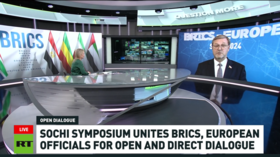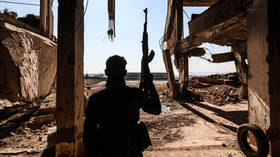EU won’t survive without Russia and BRICS – Russian senator

The EU can’t survive without cooperating with Russia and the BRICS states, Russian Federation Council Deputy Speaker Konstantin Kosachev said in an interview with RT on Saturday. Russia, however, needs the EU far less, he said.
Kosachev noted that the sanctions imposed on Russia create a significant barrier to any real cooperation with the EU.
The bloc has imposed 14 rounds of sanctions against Russia following the escalation of the Ukraine conflict in February 2022. These measures have targeted Russia’s central bank reserves held abroad, major banks, various companies, entrepreneurs, politicians, and officials, along with bans on numerous imports and exports.
The Russian Foreign Ministry has condemned the sanctions as illegitimate, while President Vladimir Putin has described them as irrational.
Kosachev pointed out that lifting these sanctions would require the unanimous approval of EU states, and that even if a majority supports removing them, dissent by just a few countries could derail such an initiative.
He concluded that the EU has effectively trapped itself, which does not benefit its interests.
“It is in a trap. And this does not work to the advantage of the European Union,” the deputy speaker emphasized. While he believes Russia will continue to thrive independent of the EU, he asserted that the EU’s survival hinges on its collaboration with Russia and other BRICS nations.
“We will survive without cooperation with the European Union on our side. The European Union will not survive without cooperation with Russia and other member states in BRICS, this is for sure.”
Earlier this month, Putin stated that Western efforts to isolate Russia economically and politically have ultimately failed.
Russian Deputy Foreign Minister Aleksandr Grushko has claimed the EU’s total losses from sanctions imposed on Russia and restrictions on its economic activity are believed to be around $1.5 trillion, according to “the most conservative estimates.”
Some EU nations contend that the sanctions have hurt the bloc more than Russia. Hungarian Prime Minister Viktor Orban cautioned on Friday that the EU’s sanctions regime “should be reviewed,” or else it risks “destroying” the European economy.
Meanwhile, the well-attended annual BRICS summit that was held in October in Kazan, the first since the group’s expansion to include Egypt, Iran, Ethiopia, and the United Arab Emirates, highlighted that Russia remains globally connected despite Western sanctions.
Delegations from 35 countries participated in the event. More than 30 nations, including NATO member Türkiye, have expressed interest in joining the group. BRICS now accounts for an estimated 37.3% of global GDP versus 14.5% for the EU.













